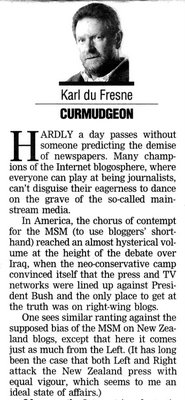 What d'you know? "Unlimited access to drugs" in prison. Not long ago I raised this subject and was told by Crasster that, "Drugs in prisons are not tolerated by any prison officer."
What d'you know? "Unlimited access to drugs" in prison. Not long ago I raised this subject and was told by Crasster that, "Drugs in prisons are not tolerated by any prison officer." Just yesterday I spent too long sitting in the sun talking about this very subject with someone who has firsthand experience. It was easier to get drugs inside than outside, they said. The "top dog, head honcho"(not a fellow inmate you understand) could get you anything you want. That was twenty years ago, I offered. Could have changed. Maybe.....
Perhaps this report is based on a tissue of lies. If not, perhaps Rimutaka is a one-off. Would you put money on it?







